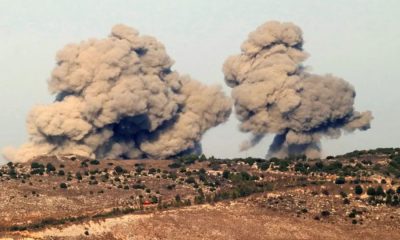International
Hezbollah rocket strikes kill seven in Israel
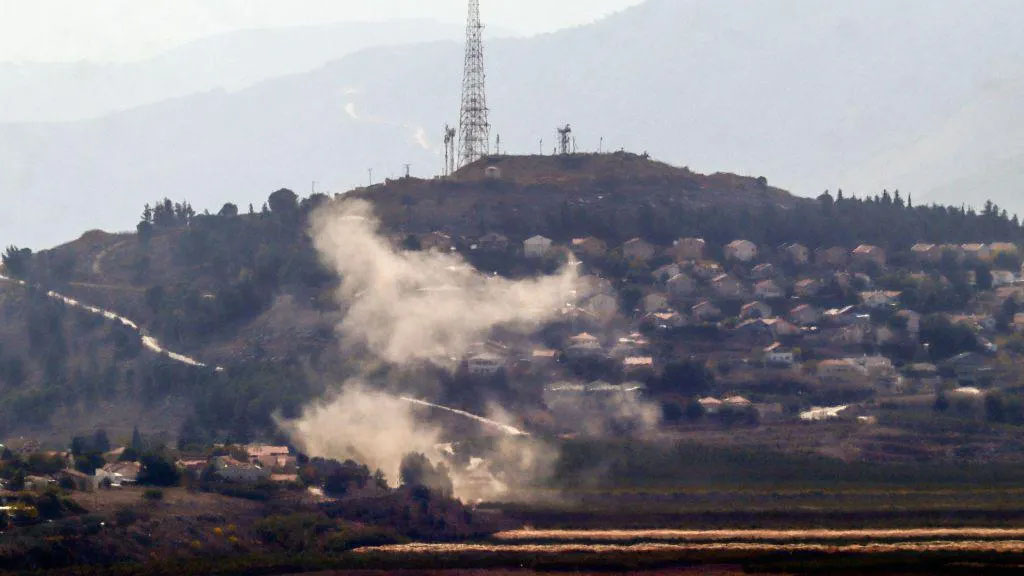
Hezbollah rocket strikes kill seven in Israel
Two separate Hezbollah rocket attacks have killed seven people in northern Israel, authorities say – the deadliest day of such strikes in months.
An Israeli farmer and four foreign agricultural workers were killed when rockets landed near Metula, a town on the border with Lebanon, Foreign Minister Israel Katz said.
Later, an Israeli woman and her adult son were killed in an olive grove near Kibbutz Afek, on the outskirts of the coastal city of Haifa.
Hezbollah said it had fired barrages of rockets towards the Krayot area north of Haifa and at Israeli forces south of the Lebanese town of Khiam, which is across the border from Metula.
The Israeli military identified two projectiles crossing from Lebanon and falling in an open area near Metula on Thursday morning.
The Israeli farmer who was killed was named by local media as Omer Weinstein, a 46-year-old father-of-four from nearby Kibbutz Dafna.
Thailand’s Foreign Minister, Maris Sangiampongsa, said on Friday that four Thai nationals were killed from rocket fire.
A fifth Thai worker was injured, he added.
Videos posted online showed them being transferred by helicopter to the Rambam Health Care Campus in Haifa.
Haaretz said Mr Weinstein and the foreign workers were in an agricultural field near the border fence at the time of the attack.
READ ALSO:
- Police arrest Sujimoto GMD Ogundele over alleged $325,000 fraud
- Bitcoin crashes below $70K, traders lose $277m
- Rivers: NDF accuses Wike of destabilising state through judicial rulings
It cited a member of the local emergency response team as saying the Israeli military had permitted them to enter the area despite Metula being inside a closed military zone.
The military established the zone at the end of September, just before it launched a ground invasion of Lebanon with the aim of destroying Hezbollah weapons and infrastructure.
Thursday’s second rocket attack reportedly hit an agricultural area near Kibbutz Afek, which is about 65km (40 miles) south-west of Metula and 28km from the Lebanese border.
The military said a total of 55 projectiles were fired towards the Western Galilee region, where the kibbutz is located, as well as the Central Galilee and Upper Galilee in the early afternoon. Some of the projectiles were intercepted and others fell in open areas, it added.
According to Haaretz, 60-year-old Mina Hasson and her 30-year-old son, Karmi, were killed by a rocket that hit an olive grove where they were picking olives.
A 70-year-old man was also lightly injured by shrapnel and taken to Rambam hospital, according to the Magen David Adom ambulance service.
“We were called to the olive grove and saw a man in his 30s lying on the ground, unconscious,” MDA paramedics Mazor and Yishai Levy told the Jerusalem Post.
“We began resuscitation efforts while conducting further searches, during which we located another casualty, also in critical condition with multi-system injuries. We provided her with medical treatment and performed resuscitation, but unfortunately, we had to pronounce both of them dead,” they said.
Meanwhile, the head of the Irish military said a UN peacekeeping base in southern Lebanon that houses Irish troops was hit by a rocket fired towards Israel on Wednesday night.
The rocket landed inside an unoccupied area of Camp Shamrock, which is 7km (4 miles) from the Israeli border, causing minimal damage on the ground and no casualties, Lt Gen Sean Clancy said.
READ ALSO:
- Edo police investigate deaths of five young people linked to food poisoning
- Fubara denies shutting down NNPCL in Rivers
- BREAKING: EFCC re-arrests Bobrisky in Lagos Airport
Irish premier Simon Harris said: “Thankfully everyone is safe but it is completely unacceptable that this happened. Peacekeepers are protected under international law and the onus is on all sides to ensure that protection.”
The deadly rocket attacks in northern Israel came as two US special envoys met Prime Minister Benjamin Netanyahu in Jerusalem to discuss a possible ceasefire deal to end the war with Hezbollah.
Netanyahu told Amos Hochstein and Brett McGurk that the main issue was what he called Israel’s ability to “thwart any threat to its security from Lebanon in a way that will return our residents safely to their homes”, his office said in a statement.
Israel went on the offensive against Hezbollah – which it proscribes as a terrorist organisation – after almost a year of cross-border fighting sparked by the war in Gaza.
It said it wanted to ensure the safe return of tens of thousands of residents of northern Israeli border areas displaced by rocket attacks, which Hezbollah launched in support of Palestinians the day after its ally Hamas’s deadly attack on Israel on 7 October 2023.
More than 2,800 people have been killed in Lebanon since then, including 2,200 in the past five weeks, and 1.2 million others displaced, according to Lebanese authorities.
Israeli authorities say more than 60 people have been killed by Hezbollah rocket, drone, and missile attacks in northern Israel and the occupied Golan Heights.
Earlier on Thursday, the Israeli military said troops were continuing operations inside southern Lebanon and that aircraft had struck dozens of Hezbollah targets throughout the country.
Lebanon’s health ministry meanwhile said Israeli strikes had killed six paramedics in three southern towns.
Four from the Hezbollah-affiliated Islamic Health Society’s Civil Defence branch, which provides emergency services, were killed when Israeli forces targeted a gathering point at Derdghaya junction, it said.
A fifth IHS paramedic was killed in an air strike on a vehicle in Deir al-Zahrani, while a strike in Zefta killed a paramedic from the Islamic Risala Scout Association, which is affiliated to the Hezbollah-allied Amal movement, according to the ministry.
There was no immediate comment from the Israeli military. But dozens of paramedics and other emergency workers have been killed and injured since it intensified its air campaign against Hezbollah five weeks ago.
The military has previously accused Hezbollah of using ambulances to transport weapons and fighters. The IHS has denied having ties to military operations.
There were also fresh Israeli strikes near Baalbek, in the eastern Bekaa Valley, a day after the Israeli military ordered the evacuation of the entire city and two neighbouring towns.
Lebanon’s state-run National News Agency (NNA) reported that a woman was killed in a strike in the Kayyal area.
Another six people were killed when a house was bombed in Maqna, which is 5km north-east of Baalbek but was not included in the evacuation zone, it said.
Hezbollah rocket strikes kill seven in Israel
BBC
International
Canada offers cybersecurity training with job placements for immigrants

Canada offers cybersecurity training with job placements for immigrants
The Canadian government, in collaboration with private sector partners, is offering a cybersecurity training programme in Calgary designed to support immigrants in securing employment in the growing tech industry.
The initiative provides hands-on learning and job placement opportunities in one of 16 entry-level cybersecurity roles. Participants will earn industry-recognized micro-credentials, equipping them with the skills needed to launch their careers.
READ ALSO:
- Rivers: Tinubu acted to save state, economy, says Karimi
- Oluwo accuses Ooni of plotting to dethrone him
- Lagos man stabs security guard for stopping his sex romp
Funded by the Alberta Ministry of Jobs, Economy and Trade, the programme is delivered in partnership with ReTrain Canada and Manpower Canada. The 12-week training session, scheduled for March, will run Monday to Friday from 9 a.m. to 4 p.m.
Through this initiative, participants will gain expertise in cybersecurity fundamentals, encryption techniques, and applied penetration testing—all at no cost—while also receiving practical work experience to enhance their employability.
Canada offers cybersecurity training with job placements for immigrants
International
US ends legal status for 500,000 immigrants
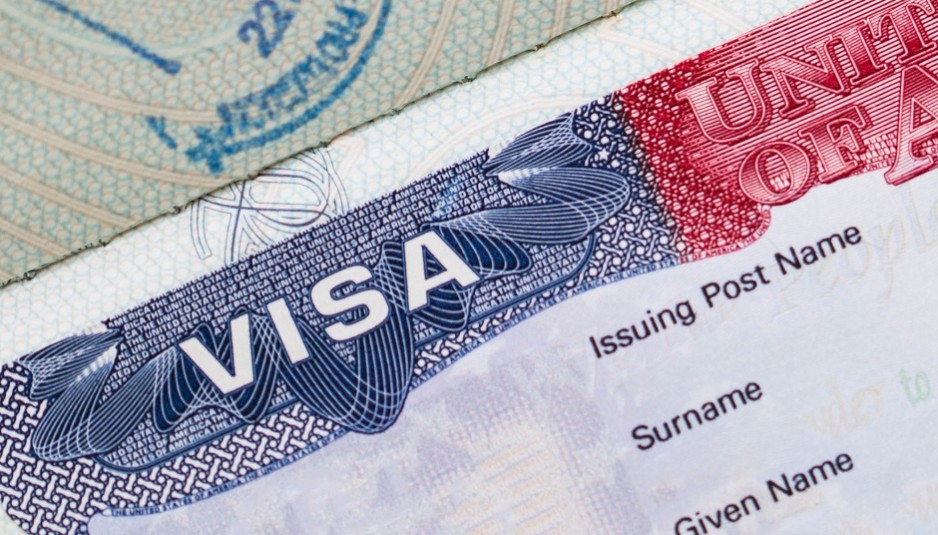
US ends legal status for 500,000 immigrants
The United States said Friday it was terminating the legal status of hundreds of thousands of immigrants, giving them weeks to leave the country.
President Donald Trump has pledged to carry out the largest deportation campaign in US history and curb immigration, mainly from Latin American nations.
The order affects around 532,000 Cubans, Haitians, Nicaraguans and Venezuelans who came to the United States under a scheme launched in October 2022 by Trump’s predecessor Joe Biden and expanded in January the following year.
They will lose their legal protection 30 days after the Department of Homeland Security’s order is published in the Federal Register, which is scheduled Tuesday.
That means immigrants sponsored by the program “must depart the United States” by April 24 unless they have secured another immigration status allowing them to remain in the country, the order says.
READ ALSO:
- Doctor removes 3-litre pus from farmer’s abdomen in Abia
- Osimhen breaks Odegbami’s Eagles goal record
- 2026 WCQ: Super Eagles move up to third place with 2-0 win in Rwanda
Welcome.US, which supports people seeking refuge in the United States, urged those affected by the move to “immediately” seek advice from an immigration lawyer.
The Processes for Cubans, Haitians, Nicaraguans, and Venezuelans (CHNV) program, announced in January 2023, allowed entry to the United States for two years for up to 30,000 migrants per month from the four countries, which have grim human rights records.
Biden touted the plan as a “safe and humane” way to ease pressure on the crowded US-Mexico border.
But the Department of Homeland Security stressed Friday that the scheme was “temporary.”
“Parole is inherently temporary, and parole alone is not an underlying basis for obtaining any immigration status, nor does it constitute an admission to the United States,” it said in the order.
Trump last week invoked rare wartime legislation to fly more than 200 alleged members of a Venezuelan gang to El Salvador, which has offered to imprison migrants and even US citizens at a discount.
US ends legal status for 500,000 immigrants
AFP
International
UK announces new passport application fees starting April 2025
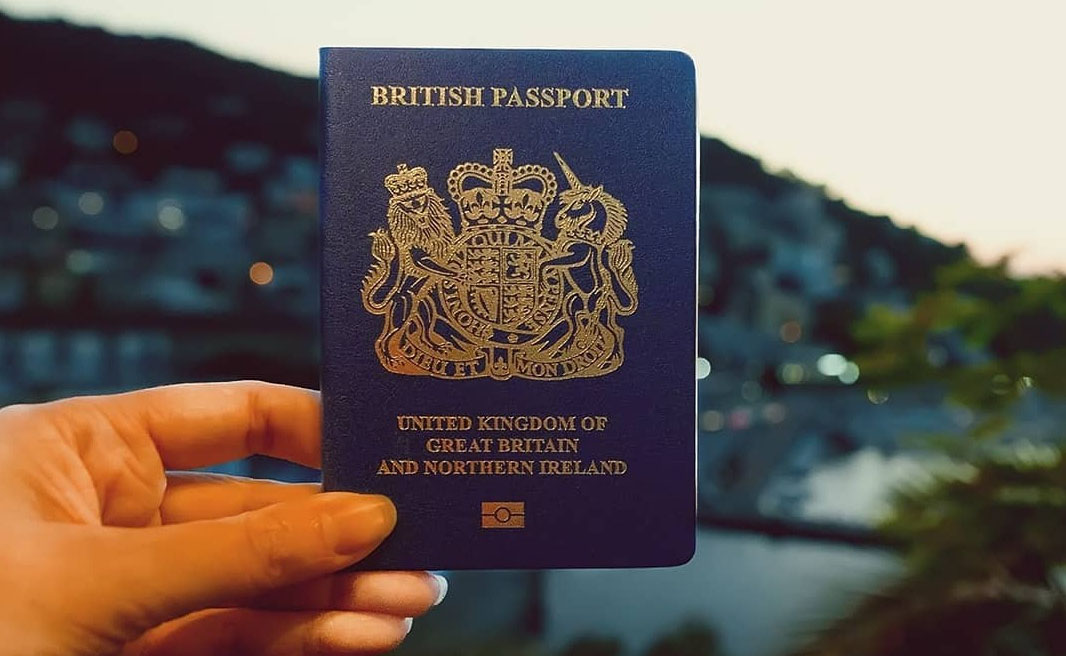
UK announces new passport application fees starting April 2025
The UK government has confirmed it will introduce new fees for passport applications beginning on April 10th, 2025.
The changes, which are still subject to parliamentary approval, will see a rise in costs for both online and paper applications, affecting adults and children alike.
According to the UK Home Office, the adjustments will apply to both domestic and overseas passport applications.
The fee increases, as stated, are part of an ongoing effort to ensure the passport system is financially self-sustaining, reducing the need for funding from general taxation. The Home Office clarified that the government does not make any profit from the fees.
Fee increases for domestic applications
Starting April 10th, 2025, the fee for a standard online application within the UK will rise for both adults and children. The cost for an adult’s application will increase from £88.50 to £94.50, while for children it will go up from £57.50 to £61.50.
Postal applications will also see an increase, with the adult fee rising from £100 to £107 and the child fee increasing from £69 to £74.
READ ALSO:
- Mohbad’s brother, Adura, arrested by police in Lagos
- UN staff member killed in central Gaza blast, five others injured
- Air Peace slashes Nigeria-London fare by N600,000
Charges to premium service fees
The Premium Service, which allows for passport issuance within one day, will also become more expensive.
- For adults, the fee will rise from £207.50 to £222
- For children, the fee will increase from £176.50 to £189.
This service is available for those who need a passport urgently and are applying from within the UK.
Higher costs for overseas applications
For individuals applying from overseas, the standard online application fee will also increase;
- The adult fee will rise from £101 to £108, and the child fee will increase from £65.50 to £70
- For paper applications made abroad, the adult fee will rise from £112.50 to £120.50, while the child fee will increase from £77 to £82.50.
The Home Office stated that the new fees are necessary to maintain the passport service and ensure it is financially viable. The fees contribute to covering the cost of processing passport applications, offering consular support to UK citizens overseas, and managing UK border services.
“The fees contribute to the cost of processing passport applications, consular support overseas, including for lost or stolen passports, and the cost of processing British citizens at UK borders,” the office said.
It is also related that in 2024, 99.7% of standard applications from the UK were processed within three weeks, where no additional information was required. Customers are advised to apply well in advance of their travel plans to avoid delays.
These fee adjustments are in line with guidelines from HM Treasury, which regularly reviews passport fees.
UK announces new passport application fees starting April 2025
-

 International2 days ago
International2 days agoUK announces new passport application fees starting April 2025
-

 metro23 hours ago
metro23 hours ago‘We’re not hiring,’ NNPC denies viral recruitment adverts
-

 metro1 day ago
metro1 day agoMore trouble brews in Rivers as Ijaw congress considers self-determination option
-

 metro2 days ago
metro2 days agoCourt lifts order stopping Senate probe on Natasha Akpoti
-

 metro2 days ago
metro2 days agoMohbad’s brother, Adura, arrested by police in Lagos
-
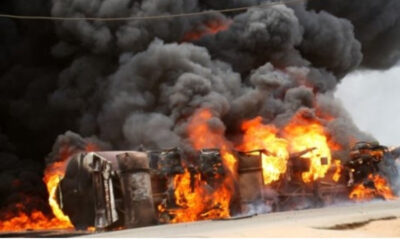
 metro3 days ago
metro3 days agoTanker explodes on Abuja bridge, many feared dead, 30 vehicles burnt
-
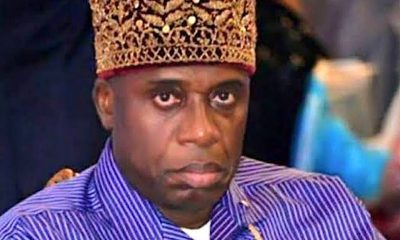
 Politics3 days ago
Politics3 days agoEmergency rule cannot stand in Rivers, says Amaechi, mobilises against Tinubu
-

 metro1 day ago
metro1 day agoAkpabio told me I’d make good movements with my waist – Natasha

